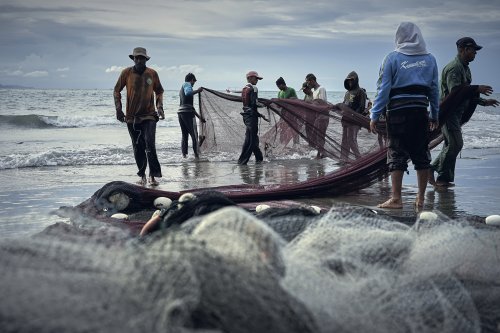“It’s time to act”- high rates of harm prompt call for more safety training in the fishing industry

- More than a quarter of fishers (26%) around the world have experienced harm at work in the past two years – more than any other industry.
- Less than three in ten (27%) of those who work in the industry say they have ever received safety and health training.
- Fishers in low-income countries are more likely to be harmed at work, and less likely to have received safety training.
A quarter of fishers (26%) have been harmed on the job in the last two years, according to Lloyd’s Register Foundation’s latest World Risk Poll report, Engineering safer workplaces: Global trends in occupational safety and health. Yet, data from the report shows that more than nearly three quarters (73%) have never received any safety training. The figure makes fishing one of the industries with the lowest rates of training in the world.
The data was gathered by global analytics firm Gallup, which conducted 147,000 interviews in 142 countries and territories around the world, and offers one potential explanation for the worrying figures. Like other “riskier” industries, such as construction and mining, fishing skews heavily towards demographics that were found to be more at risk of harm regardless of their occupation, such as those in more precarious financial situations.
For instance, 15% of the fishing workforce declared they could only cover their basic needs for less than a week if they lost all income. This demographic, globally, was found to be more vulnerable to workplace harm than average – a third (34%) of them experienced it in the past two years (well above the global average of 18%). Training rates also relate to financial resilience; globally, less than a quarter (23%) of those who said they could only cover their basic needs for less than a week have received safety training, below the global average of 38%.
Several organisations are striving to tackle the issue. Among them is the International Fund for Fishing Safety, a Lloyd’s Register Foundation initiative managed by The Seafarers’ Charity, in partnership with the FISH Platform. The fund aims to financially support the delivery of fishing safety projects around the world and so far, £200,000 worth of grants have been awarded, supporting 65,000 fishers worldwide – but the fund’s partners say much more is needed.
Dr Daryl Attwood, Project Director at Lloyd’s Register Foundation, said: “Fishing’s reputation as a dangerous occupation is well-known – but sufficient mitigative actions are obviously well overdue”.
“International regulations provide an important framework for countries and businesses, but these can only go so far, especially for fishers in low-income countries who may believe their only option is to “fish today”, regardless of safety. Providing regular, tailored training, along with basic safety equipment, must be near the top of agendas everywhere.
“The work of the International Fund for Fishing Safety in supporting local safety projects around the world is crucial – but it’s just a start. All fishing industry participants, including banks and other direct and supporting institutions, need to provide more funds to finance fishing safety interventions. We’d like to encourage them to talk to us about how these funds can be mobilised.”
Alan McCulla, Coordinator at the International Fund for Fishing Safety, added: “By providing better training, access to safety equipment and auditing for safer vessels, the International Fund for Fishing Safety aims to reduce accidents, prevent near misses, and save lives. But there’s also a broader benefit to the whole marine ecosystem.
“Improved safety practices underpinned by existing international safety standards empower fishers to move from survival mode – where overfishing potentially means minimising time spent at sea – to long-term sustainability, ensuring the livelihoods of the local communities for generations to come.
“In the end, fisher safety is not a competing priority with sustainable fishing; it is essential to it.”
Lloyd’s Register Foundation is also working with the UN Food and Agriculture Organisation (FAO) to encourage and facilitate the supply of insurance to fishers using small vessels, primarily in less wealthy regions. As well as supporting the development of safety guidelines in pilot countries across Latin America, Africa, and Asia, the programme aims to raise awareness of guidelines, safety and vessel inspection methods, and fast-track access to fishing vessel insurance services.
The full 2024 World Risk Poll report, ‘Engineering safer workplaces: Global trends in occupational safety and health’, can be accessed here. The full data, including country and demographic-specific data, is also available on request.
For any media enquiries, including interview requests and additional comments, please email lrfoundation@wpragency.co.uk.
For any data-related queries and requests, contact Ed Morrow, Senior Campaigns Manager at Lloyd’s Register Foundation, at ed.morrow@lrfoundation.org.uk.

